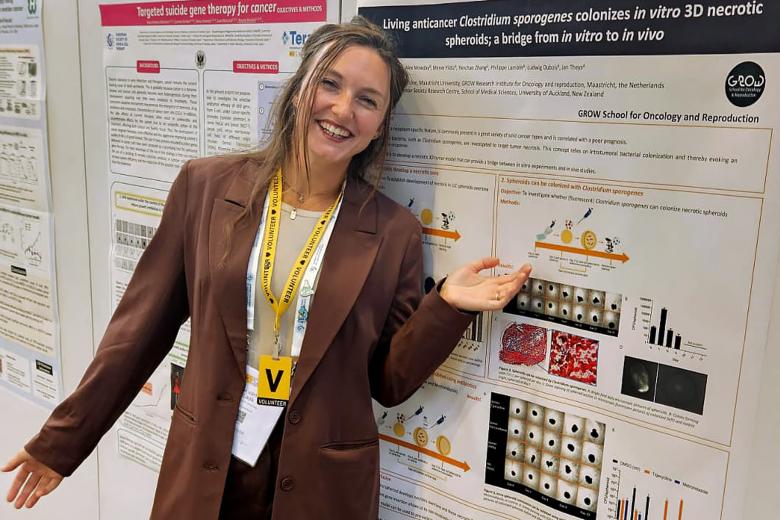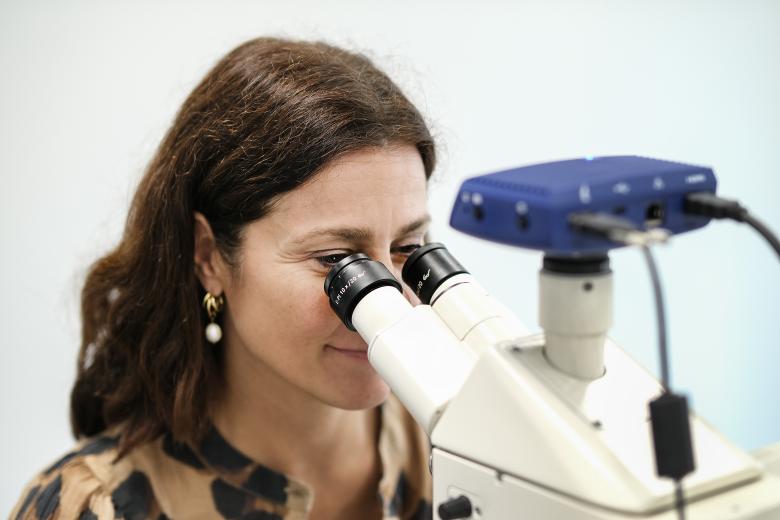Better understanding of early-onset dementia after PhD research
In the five years before diagnosis, people with early-onset dementia were having symptoms that could potentially point to their developing dementia. This is one of the key findings of epidemiologist Stevie Hendriks after four years or research into early-onset dementia. Her research has brought knowledge knowledge of this condition a major step forward.
Dementia is getting more and more attention, but early-onset dementia is neglected, Hendriks explains: "People still think of dementia mainly in terms of frail elderly people, whereas dementia can also develop before the age of 65. We call this Young Onset Dementia. In my research, we calculated that worldwide there are almost 4 million people with early onset dementia and 370,000 cases are added annually. For the Netherlands this means 14,000 to 17,000 people with early onset dementia, with 1,250 new cases per year."
Unraveling early-onset dementia
There was relatively little research in science on this form of dementia. Therefore, Hendriks conducted research into the causes, diagnostics, and course of care for these patients. It is important for Hendriks and her colleagues at the Alzheimer Center Limburg to unravel dementia at an early age: understanding the disease can improve the outlook for those who develop dementia at a young age. Timely recognition and the right help and support can improve the quality of life of people with dementia at an early age.
Risk factors
In her search for the causes of early-onset dementia, Hendriks found that genes play a larger role than in dementia later in life. In addition, she describes in her dissertation 14 other and partly influenceable risk factors that have a link with the risk of dementia at an early age: lifestyle factors, such as alcohol consumption, diseases such as diabetes and stroke and environmental factors such as the lack of a social network.
Hendriks: "To better understand the mechanisms behind these factors, more research will have to take place. Hopefully this will eventually lead to a better understanding of how dementia can develop at this young age and which individuals could benefit from lifestyle advice, which will help us reduce the risk of dementia in general but also dementia at a young age."
Signs Before Diagnosis
To properly help patients with early-onset dementia, it is crucial that they receive a diagnosis in time. In practice, however, patients sometimes have various symptoms for years without it becoming clear that it is dementia. Hendriks analyzed the care records of patients with early-onset dementia and made an important discovery: as early as five years before diagnosis, patients were already reporting complaints to their family doctor. Five years before the diagnosis, these are mainly cognitive complaints, such as problems with concentration and memory. Three years before diagnosis, there are often social complaints, such as problems with relationships or at work. One year before diagnosis, patients often experience problems in daily functioning.
"Of course, it is not easy for a general practitioner to link these kinds of symptoms to dementia," Hendriks explains, "often something else is thought of, such as stress or burnout. This is understandable: they often only see someone with dementia at a young age once or twice in their career. Hopefully, this study is nevertheless a step toward greater awareness and faster recognition by general practitioners."
Care After Diagnosis
Finally, Hendriks analyzed the course of care after people were diagnosed. For example, 43% of patients received some form of day care after the diagnosis and 44% were admitted to a nursing home. At the same time, Hendriks saw that some of the patients and their informal caregivers were initially reluctant to accept care: "that may have to do with the need to remain independent as long as possible. Or with the fact that people simply find it difficult to accept help or find appropriate help. It is important that general practitioners and caregivers realize this so that they can start the conversation about this with patients and their loved ones."
Follow-up research
It was recently announced that a national consortium, including researchers from Maastricht UMC+, led by Radboud UMC have received a 6 million grant from ZonMw for research into early-onset dementia. Stevie Hendriks will play a role in this research after her PhD: "we have been able to investigate many aspects with my research, but we are not there yet. That is why it is so important that we continue research into early detection, risk factors and appropriate care and support in early-onset dementia. I'm glad that this grant gives us the opportunity to do that and that I get to play a role in it."
Also read
-
GMO bacteria to target tumours
PhD candidate Jella van de Laak on how a genetically modified bacterium fights solid cancer tumours at their oxygen-deprived core.
-
Fresh air
Newly appointed professor Judith Sluimer (CARIM) talks about oxygen in heart functioning and the 'fresh air' the academic world needs.
-
GROW research: all-in-one test for genetic defects in embryos🧪
Researchers at Maastricht UMC+ and GROW have developed a technique that can analyse the entire genome in a single test, allowing for faster determination of embryos suitable for successful pregnancy.